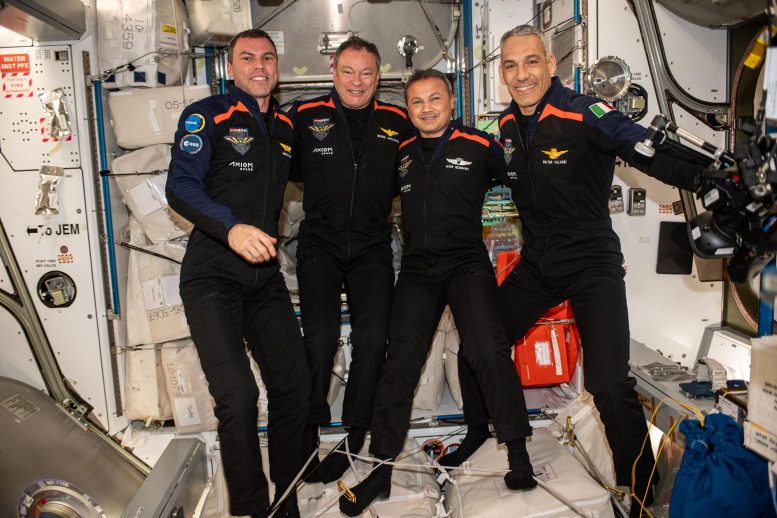A SpaceX Dragon spacecraft carrying the Ax-3 crew splashed down off the coast of Daytona, FL on February 9. Credit: Axiom Space
Ax-3’s successful return from the International Space Station marks a key milestone in NASA’s plan to foster a commercial space economy, emphasizing the growing accessibility and commercial potential of low Earth orbit.
The third private astronaut mission to the International Space Station successfully completed its journey as part of NASA efforts to create commercial opportunities in space. Axiom Mission 3 (Ax-3) and its four crew members safely returned to Earth Friday, splashing down off the coast of Daytona, Florida.
Axiom Space astronauts, Michael López-Alegría, Walter Villadei, Marcus Wandt, and Alper Gezeravci returned to Earth aboard a SpaceX Dragon spacecraft at 8:30 a.m. EST on February 9, completing their nearly 22-day mission that included 18 days aboard the space station. Teams aboard SpaceX recovery vessels retrieved the spacecraft and astronauts.
NASA’s Commercial Space Ambitions
“Low Earth orbit is now within humanity’s economic sphere of influence. It presents the best opportunities for the U.S. commercial space sector to capture new global and domestic markets and to provide critical capabilities to the nation’s space objectives,” said Phil McAlister, director of NASA’s commercial space division at NASA Headquarters in Washington. “This ground-breaking Ax-3 mission is part of a larger effort, enabled by NASA, to open space to more people, more research, and more opportunities as the agency prepares for the transition to future private space stations at the end of this decade.”

The Axiom Mission 3 crew aboard the International Space Station, pictured from left to right: Marcus Wandt, Michael López-Alegría, Alper Gezeravci, and Walter Villadei. Credit: Axiom Space
The Ax-3 mission launched at 4:49 p.m. on January 18 on a Falcon 9 rocket from NASA’s Kennedy Space Center in Florida. Approximately 37 hours later, Dragon docked to the Harmony module’s forward port. The astronauts undocked from the same port at 9:20 a.m. Wednesday, to begin the trip home.
The crew spent over two weeks conducting microgravity research, educational outreach, and commercial activities. The spacecraft returns to Florida for inspection and processing at SpaceX’s refurbishing facility at Cape Canaveral Space Force Station, where teams will examine the spacecraft’s data and performance throughout the flight. Throughout their mission, the astronauts conducted over 30 science experiments, and returned science, including NASA cargo, back to Earth.
Expanding Commercial Opportunities in Orbit
Supporting private astronaut missions is part of NASA’s strategy to create a vibrant commercial economy in orbit where the agency will become just one of many customers.
The Ax-3 mission embodies the culmination of NASA’s efforts to foster a commercial market in low Earth orbit and continue a new era of space exploration that enables more people and organizations to fly multiple mission objectives. This partnership expands the arc of human spaceflight history and opens access to low Earth orbit and the International Space Station to more people, science, and commercial opportunities.





